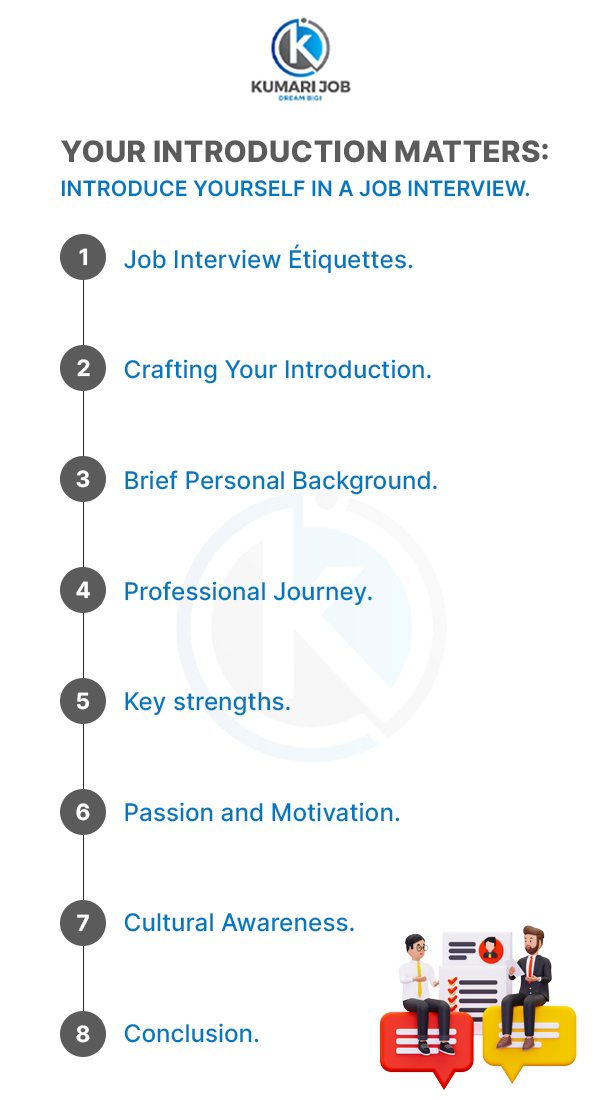Introduction
In professional growth, the job interview is the pivotal gateway to one's aspirations. It unfolds as a rare platform to artfully exhibit a tapestry woven with skills, experiences and the unique essence of one's personality. Amidst the array of inquiries poised to unravel, the initial query often acts as the rudder, steering the course for the entire conversation: "Can you please introduce yourself in a job interview?" Despite its apparent simplicity, this question holds the potential to be a decisive crossroads. Within the contours of this blog, we embark on an exploration of the optimal strategies to effectively present oneself. When wielded adeptly, these strategies imprint a lasting silhouette in the minds of potential employers. Describing yourself in a job interview isn't just an exchange of information; it's an art that marries insight with strategy. It's the craft of weaving a narrative that seamlessly interlaces academic milestones, resonates with tangible encounters, and spotlights core strengths. As we journey through this discourse, the emphasis remains on divulging credentials and forging a connection. This connection transmutes into a narrative transcending the interview room, carving an indelible path forward.
Job Interview Étiquettes
Practising good etiquette in an interview is crucial for leaving a positive impression. This includes confident body language, appropriate attire, respectful communication, punctuality, and a genuine interest in the company. Including a thank-you note after the interview further solidifies your reputation as a polished candidate.
Here are some things we should focus on while showing yourself in an interview.
- Dress Appropriately: Adhere to the company's dress code and pay attention to grooming details.
- Express Gratitude: Show appreciation for the interview opportunity and respectfully address interviewers.
- Listen Actively, Respond Concisely: Listen attentively, avoid interruptions, and answer questions concisely.
- Maintain a Professional Demeanor: Refrain from negative comments about past experiences throughout the interview.
Crafting Your Introduction
Presenting yourself professionally in a job interview is a skill that harmoniously connects personal and professional aspects into a captivating story. This summary highlights your education, experience, strengths, and enthusiasm for the company's mission, highlighting academic success and practical application. It emphasises analytical thinking, attention to detail, and adaptability, showcasing your qualifications and impact on the interviewer. The key points to remember are :
- Overview of educational and professional journey.
- Emphasis on commitment and development supported by academic background.
- Showcasing practical application of knowledge in diverse experiences.
- Highlighting core strengths: analytical thinking, attention to detail, and adaptability.
- Genuine enthusiasm for the company's mission is a strong thread throughout.
Brief Personal Background
When asked about your professional background, here is a simple introduction sample to help you answer the question confidently. I come equipped with a degree that I earned from ABC University, showcasing my commitment to academic excellence. Throughout my educational journey, I consistently was at the top of my class, highlighting my dedication to learning and mastery in my chosen field. My time at ABC University wasn't just about academic achievements; I actively engaged in various extracurricular projects, particularly in coding, which gave me a holistic insight into the nuances of software development. These endeavours nurtured my enthusiasm for finding creative solutions and honed my meticulous problem-solving approach. My academic background has also enabled me to develop discipline, adaptability, and a constant eagerness to keep up with industry trends. This well-rounded education has laid a sturdy foundation upon which I can confidently construct my professional ambitions.
Professional Journey
Your professional career is a narrative that highlights your accomplishments, progress, and adaptability. It's essential to give a concise outline when talking about something in an interview. Outline your professional development initially, highlighting significant roles, obligations, and achievements. Showcase any times you took on extra responsibilities or oversaw important projects to exhibit your leadership and initiative. Don't be afraid to talk about your difficulties, but focus on the fixes you made and the lessons you discovered. Mention any particular abilities or knowledge you've picked up and explain how they help you excel in the potential position.
Remember that your professional history speaks volumes about your abilities, development, and potential to contribute significantly to the company's future success.
Key strengths
In an interview, balancing professional and personal qualities is crucial. Emphasising attention to detail, problem-solving skills, teamwork, and analytical understanding is essential for a professional setting. Adaptability, leadership, and time management skills demonstrate a person's suitability for a particular profession. On a personal level, strong communication, empathy, and resilience are crucial for personal growth and development. A strong work ethic, commitment, and philosophy of continual learning demonstrate dedication to personal growth. Demonstrating these abilities requires providing concrete examples and anecdotes, providing more substance and allowing the interviewer to see how the candidate fits into their group or company. A well-rounded understanding of both professional and personal strengths makes the candidate an invaluable asset in any professional situation.
Passion and Motivation
In an interview, expressing passion and motivation through actions is crucial. Research the organisation, understand its goals, and highlight your dedication to the profession. Highlight achievements, initiative, and a proactive personal and professional development approach. Sincere enthusiasm and motivation are contagious, making a positive impression on interviewers.
- Demonstrating passion and motivation through specific actions is more effective than verbal expressions.
- Thorough research is essential in understanding an organisation's goals, principles, and recent successes and positions.
- Showcase your proactive approaches to motivation, such as lifelong learning, setting high standards for yourself, and looking to others in your field for motivation.
- Align your values and professional goals with the organisation's, highlighting occasions where your commitment resulted in noteworthy accomplishments.
Cultural Awareness
Cultural awareness is crucial in today's globalised work environment, allowing individuals to communicate effectively with people from diverse backgrounds. Mastering these skills can improve job interviews and increase the likelihood of being selected for a position. Cultural awareness demonstrates a proactive and forward-thinking demeanour, demonstrating a readiness to contribute harmoniously within a diverse team. By refining communication proficiencies tailored to diverse settings, individuals can create a lasting positive impression during interviews and increase their chances of success in their chosen positions.
- Cultural awareness is crucial for effective adaptation and collaboration within diverse teams in today's globalised work environment.
- Emphasizing dedication to open and respectful communication with individuals from various backgrounds demonstrates a proactive approach.
- The ability to successfully navigate cultural differences shows readiness to work within a team that works together.
Introduction as a Fresher
The prospect of a job interview can be intimidating to a fresher. Going in with minimal experience may seem like a hurdle, but it's a chance to showcase your potential. When you're asked to introduce yourself in an interview for freshers, highlight your eagerness to learn and the skills you've gained through coursework and projects. This will convey your proactive approach and readiness to contribute positively.
- Start with a Strong Opening: Begin with a confident and professional greeting, such as "Good [morning/afternoon], I'm [Your Name]."
- Briefly Mention Your Educational Background: Provide a concise overview of your academic qualifications, mentioning any honours or relevant coursework.
- Highlight Internships, Projects, or Volunteer Work: Discuss any hands-on experiences, internships, or projects related to the field, emphasising skills gained.
- Showcase Transferable Skills: Emphasize skills like teamwork, communication, problem-solving, and time management that apply to the job.
- Research the Company: Gather information about the company's mission, values, and recent projects to weave into your introduction.
- Address How You Can Add Value to the Company: Consider how your unique skills and perspective can contribute to the company's success.
Sample and Introduction
Here is a simple way to introduce yourself in a job interview sample:
"Good morning/afternoon! I'm delighted to be here today. My name is [Your Name], and I am a recent graduate with a degree in [Your Field] from [University Name]. Throughout my academic journey, I consistently strived for excellence, earning high academic honours that underscore my dedication to learning.
While at university, I had the privilege of working on diverse projects that exposed me to the intricacies of [Field] and deepened my understanding of various methodologies. These experiences have equipped me with a solid foundation to tackle challenges and innovate effectively.
During an enriching internship opportunity at XYZ Company, I was part of a dynamic team that collaborated on impactful projects. One project, in particular, involved creating a solution that positively impacted thousands of users. This experience sharpened my technical skills and underscored the importance of teamwork and effective communication.
A strength that has consistently driven my pursuit is my meticulous attention to detail. I thrive when confronted with complex problems, finding satisfaction in crafting elegant solutions. Moreover, my belief in the power of collaboration drives me to excel in environments where diverse perspectives converge to create something exceptional.
I am genuinely excited about contributing my skills and enthusiasm to [Company Name]'s innovative endeavours. The company's reputation for pushing boundaries and fostering an environment of growth aligns seamlessly with my aspirations. I'm eager to bring my passion for [Field] to the [Job Title] role and continue evolving as a dedicated professional."
Frequently Asked Questions
Providing a concise yet comprehensive overview of your background, skills, and experiences is critical. Focus on relevant achievements, highlight strengths, and touch on personal qualities that align with the job role.
While discussing your background, prioritise experiences related to the job. Highlight your skills, such as problem-solving, teamwork, or adaptability. Mention any noteworthy accomplishments or projects that demonstrate your expertise.
Striking the right balance between showcasing your strengths and remaining modest is crucial. Present your achievements confidently and acknowledge areas where you're eager to learn and grow.
Yes, tailoring your self-description to the specific job and company is essential. Focus on aspects of your background and experiences that directly relate to the role and align with the company's values and goals.
Avoid providing excessive personal information, delving into unrelated anecdotes, or using clichés. Stay focused on professional aspects, and avoid negative self-talk or speaking ill of previous experiences or colleagues.
When asked to "introduce yourself in an interview for freshers," one can effectively present their background by emphasising their educational journey, essential skills, and pertinent experiences like projects, internships, or extracurricular engagements. This provides a platform to showcase enthusiasm and potential aligned with the role's expectations while expressing a keen willingness to learn and contribute.
Conclusion
A job interview is crucial in professional growth, allowing individuals to showcase their experiences and personality. Effective self-presentation involves seamlessly intertwining academic milestones, tangible encounters, and core strengths, creating a narrative transcending the interview room. Proper etiquette, including confident body language and engaging communication, showcases professionalism and respect. Crafting a captivating introduction that seamlessly blends personal and professional aspects, highlighting core strengths and genuine enthusiasm for the company's mission, is essential. Expressing natural confidence for the company and role, aligning personal ethos with the company's vision, and demonstrating cultural awareness is crucial in today's globalised work environment. Mastering the art of introducing oneself in a job interview requires strategic insight and authentic narrative, extending beyond words and demonstrating adaptability and collaboration prowess.
Read More: http://tinyurl.com/3nfzcuyk.




